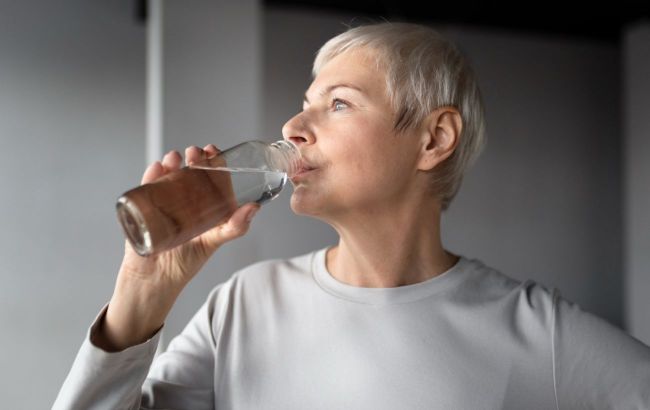Water essential for life: What happens when there's low amount of fluid in body
 Why dehydration occurs and how to prevent it (Photo: Freepik)
Why dehydration occurs and how to prevent it (Photo: Freepik)
Water is critically important for human life. It is essential for normal bodily processes. Dehydration occurs with moisture loss, according to the Ukrainian medical community Zdorovishi razom (Healthier together).
Symptoms of dehydration
Water is essential for many metabolic processes: it helps maintain normal body temperature, removes metabolic waste and toxins through urine, and more.
Normal metabolism can be disrupted with a loss of just 1% of the body's water.
Symptoms of dehydration include:
- Thirst
- General malaise
- Loss of appetite
- Skin redness
- Drowsiness
- Increased pulse
- Elevated body temperature
- Nausea
- Gastrointestinal disturbances
- Dizziness
- Headache
- Shortness of breath
- Tingling in extremities
- Loss of mobility
- Muscle cramps
- Body cooling
It is important to note that dehydration symptoms vary depending on the severity, age, and individual characteristics of the person.
Causes of dehydration include:
- Increased sweating due to high body or environmental temperatures, or excessive physical exertion
- Food poisoning accompanied by diarrhea and vomiting
- Consumption of foods that lead to increased water loss
- Use of certain medications
- Heatstroke or sunstroke
- Burns
How much water is actually needed to maintain health
According to the National Academies of Sciences, Engineering, and Medicine in the US, the daily water intake recommendation is 3.7 liters for men and 2.7 liters for women. These figures include fluids from all sources, with approximately 20% coming from food, mainly fruits and vegetables, and the remainder from beverages.
Signs of adequate hydration include the absence of thirst and light yellow urine.
Children's water needs also depend on their age and activity level. Typically, they require:
- Children 1-3 years: about 1 liter per day
- Children 4-8 years: approximately 1.25 liters per day
- Children aged 8 years and older: from 1.75 to 2 liters per day
Groups with increased water needs include:
- Athletes
- People with excess body weight
- People with increased sweating
- Pregnant and breastfeeding women
- People living in hot climates or at high altitudes
- People with elevated temperatures, vomiting, or diarrhea
This material is for informational purposes only and should not be used for medical diagnosis or self-treatment. Our goal is to provide readers with accurate information about symptoms, causes, and methods of detecting diseases. RBС-Ukraine is not responsible for any diagnoses that readers may make based on materials from the resource. We do not recommend self-treatment and advise consulting a doctor in case of any health concerns.

